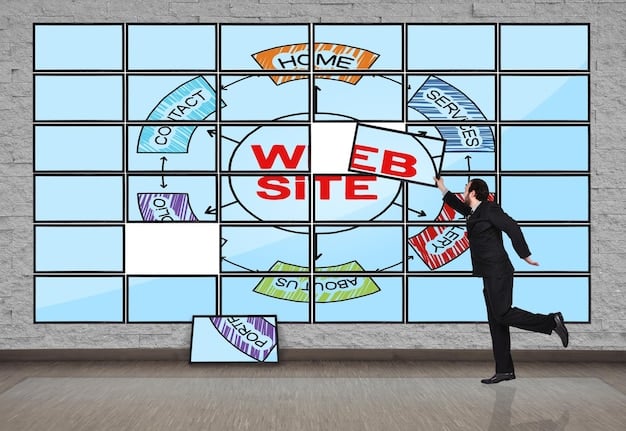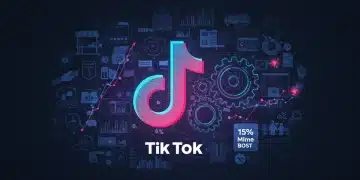Social Media & US Politics: Bridging the Digital Divide

The impact of social media on US political discourse is multifaceted, contributing to increased polarization and the spread of misinformation, while also offering new avenues for political engagement and mobilization, demanding a critical understanding of how to navigate this digital divide.
The rise of social media has profoundly reshaped the landscape of political discourse in the United States. The impact of social media on US political discourse: navigating the digital divide presents both opportunities and challenges, influencing how citizens engage with politics, consume information, and form opinions. Understanding this evolving dynamic is crucial for fostering a healthy democracy in the digital age.
The Evolution of Political Discourse in the Digital Age
The way Americans talk about politics has changed dramatically with the advent of social media. This digital transformation has brought both advantages and disadvantages to the forefront, altering the traditional dynamics of political communication and engagement.
From town hall meetings to Twitter threads, the arena for political debate has expanded exponentially. Social media platforms have become vital spaces for citizens, politicians, and organizations to connect, share ideas, and mobilize support.
The Rise of Online Political Communities
Social media has facilitated the formation of online political communities where like-minded individuals can share opinions, discuss issues, and organize collective action. These communities can amplify voices that were previously marginalized, but also contribute to echo chambers.
The Speed and Reach of Information
Social media enables information to spread rapidly across geographical boundaries. This can lead to quicker dissemination of news and updates, but also the swift propagation of misinformation and propaganda, impacting public opinion.

Social media, with its unprecedented reach and speed, has revolutionized political discourse. It’s essential to understand how this transformation affects the way Americans engage with politics and receive information.
- Increased accessibility to political information for a wider audience
- Formation of echo chambers and online radicalization
- The impact of algorithms on shaping political narratives
- The role of social media in political campaigns and mobilization
In conclusion, social media has transformed political discourse by accelerating the spread of information and creating online communities. While this has democratized access to political content, it also carries risks like echo chambers and misinformation.
The Spread of Misinformation and “Fake News”
One of the most significant challenges posed by social media is the proliferation of misinformation, often referred to as “fake news.” This phenomenon can have profound implications for public understanding and political decision-making.
The ease with which false or misleading information can be created and shared on social media platforms makes it difficult for individuals to discern fact from fiction.
The Role of Algorithms in Spreading Misinformation
Social media algorithms designed to maximize user engagement can inadvertently amplify the reach of misinformation. Sensational or emotionally charged content often spreads more quickly, regardless of its accuracy.
The Impact of Misinformation on Public Opinion
Exposure to misinformation can distort public perceptions of political issues and candidates. This can lead to uninformed decisions and decreased trust in traditional media outlets and political institutions.

The spread of misinformation poses a serious threat to democratic processes. It’s vital to comprehend how social media algorithms and user behaviours contribute to this issue.
- The speed and scale at which misinformation can spread
- The emotional and psychological factors that make people susceptible to misinformation
- The role of foreign actors in disseminating propaganda
- The difficulty of fact-checking content in real-time
In summary, the spread of misinformation through social media poses a significant challenge to informed democratic discourse. Algorithms and emotional engagement contribute to the rapid dissemination of false content, distorting public opinion and eroding trust in institutions.
Polarization and Echo Chambers
One of the key concerns surrounding social media’s effect on political discourse is the rise of polarization and echo chambers. These phenomena can create division in society and hinder constructive dialogue.
Social media platforms often reinforce existing beliefs by exposing users primarily to information and perspectives that align with their own.
The Creation of Echo Chambers
Echo chambers occur when individuals are primarily exposed to information and opinions that confirm their existing beliefs. This can reinforce biases and make people less open to considering alternative viewpoints.
The Amplification of Extreme Views
Social media algorithms can amplify extreme views by connecting like-minded individuals and promoting content that elicits strong emotional reactions. This can push people further to the political fringes.
The rise of polarization and echo chambers poses a serious challenge to constructive political debate. Understanding their causes and effects is critical to fostering a more inclusive and tolerant society.
- The impact of filter bubbles on political understanding
- The psychological drivers behind political polarization
- The role of social media in creating and reinforcing group identities
- The effects of polarization on political gridlock and social cohesion
In conclusion, polarization and echo chambers contribute to political division and hinder productive dialogue. By reinforcing existing beliefs and amplifying extreme views, social media can limit exposure to diverse perspectives and exacerbate social tensions.
Social Media as a Tool for Political Mobilization
While social media can contribute to negative outcomes, it has also proven to be a powerful tool for political mobilization. It allows individuals and groups to organize, advocate for change, and make their voices heard.
Social media platforms provide a space for grassroots movements to gain momentum and challenge traditional power structures.
The Role of Social Media in Political Activism
Social media has been instrumental in organizing protests, rallies, and other forms of political activism. It facilitates communication, coordination, and information sharing among activists.
Empowering Marginalized Voices
Social media can empower marginalized voices by providing a platform for individuals and groups who are often excluded from mainstream media coverage.
Social media serves as an accessible tool for political mobilization, empowering individuals and groups to organize, advocate for change, and challenge traditional power structures.
- The role of social media in the Arab Spring uprisings
- The use of hashtags to raise awareness about social issues
- The ability of social media to bypass traditional media gatekeepers
- The challenges of organizing effective online activism campaigns
To summarize, social media plays a crucial role in political mobilization, providing a platform for grassroots movements, empowering marginalized voices, and facilitating coordination among activists.
Navigating the Digital Divide: Access and Literacy
The digital divide, which refers to the gap between those who have access to technology and those who do not, presents a significant challenge to equitable political discourse. Bridging this divide is essential for ensuring that all citizens can participate fully.
Furthermore, digital literacy is also crucial since access alone is not enough. Individuals need the skills and knowledge to critically evaluate information and engage effectively in online discussions.
Addressing the Digital Divide
Efforts to expand access to technology and internet connectivity are vital for ensuring that all citizens can participate in online political discourse.
Promoting Digital Literacy
Digital literacy education equips individuals with the skills to critically evaluate online information, identify misinformation, and engage in constructive dialogue.
Bridging the digital divide through increased access and improved literacy is not only essential for equitable political engagement, but also for protecting democratic structures against digital manipulation. Only with these steps the promises of social media for US politics can be fulfilled.
- The impact of socioeconomic status on digital access
- The importance of digital literacy in combating misinformation
- The role of government and community organizations in bridging the digital divide
- The effects of the digital divide on political representation
In conclusion, addressing the digital divide requires expanding technology access and promoting digital literacy. These steps are essential for ensuring that all citizens can participate fully and effectively in online political discourse.
The Future of Political Discourse on Social Media
The future of political discourse on social media will likely be shaped by technological innovation, evolving user behaviors, and ongoing efforts to combat misinformation and polarization.
Artificial intelligence (AI) and machine learning will play an increasingly important role in shaping the information that people see and the way that they interact with it.
The Role of Artificial Intelligence
AI algorithms could be used to identify and remove misinformation, promote constructive dialogue, and personalize political content. However, they could also be used to manipulate public opinion and reinforce biases.
The Importance of Media Literacy
As social media continues to evolve, media literacy will become even more critical. Individuals need the skills to navigate the digital landscape, evaluate information critically, and engage in responsible online behavior.
The future of political discourse on social media will be shaped by several factors, including algorithms, media literacy, and efforts to promote civil debate and counteract the spread of misinformation.
- The impact of virtual reality (VR) and augmented reality (AR) on political communication
- The potential for decentralized social media platforms to foster more democratic discourse
- The challenges of regulating social media content without infringing on free speech
- The long-term effects of social media on political participation and civic engagement
In summary, the future of political discourse on social media will be shaped by evolving user behaviors, technological innovation, and efforts to combat misinformation and polarization. Media literacy, the development of ethical AI algorithms, and the implementation of content regulation policies will be critical in ensuring a healthy and democratic online political landscape.
| Key Aspect | Brief Description |
|---|---|
| 📢 Misinformation | Easy spread affects public’s understanding of facts. |
| 🌐 Polarization | Echo chambers reinforce beliefs, limiting open views. |
| 📱 Mobilization | Tool to organize and challenge political status quo. |
| 💻 Digital Divide | Unequal access hinders societal democratic engagement. |
Frequently Asked Questions
▼
Social media influences US elections by enabling rapid information dissemination, shaping public opinion through targeted ads, and mobilizing voters. However, it also spreads misinformation and biases public perception.
▼
Algorithms amplify polarization by prioritizing content that aligns with users’ existing beliefs, creating echo chambers. This limits exposure to diverse viewpoints and reinforces partisan divisions in society.
▼
Misinformation can be combatted through media literacy education, fact-checking initiatives, and platform accountability. These strategies ensure people critically assess social media content and platforms effectively regulate false narratives.
▼
Benefits include quick mobilization, broader reach, and accessibility. Activists use these features to bypass traditional media gatekeepers, amplify marginalized voices, and organize movements efficiently.
▼
The digital divide creates unequal opportunities, excluding many from online political discussions and engagement. This disparities create skewed political representation, impacting inclusion and participation.
Conclusion
In conclusion, the relationship between social media and U.S. political discourse is complex and constantly evolving. It presents opportunities for enhanced engagement and mobilization, but also poses challenges related to misinformation, polarization, and the digital divide. Addressing these challenges through increased awareness, media literacy, and responsible platform governance is essential for fostering a healthy democracy in the digital age.





